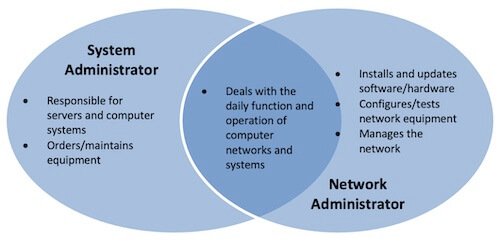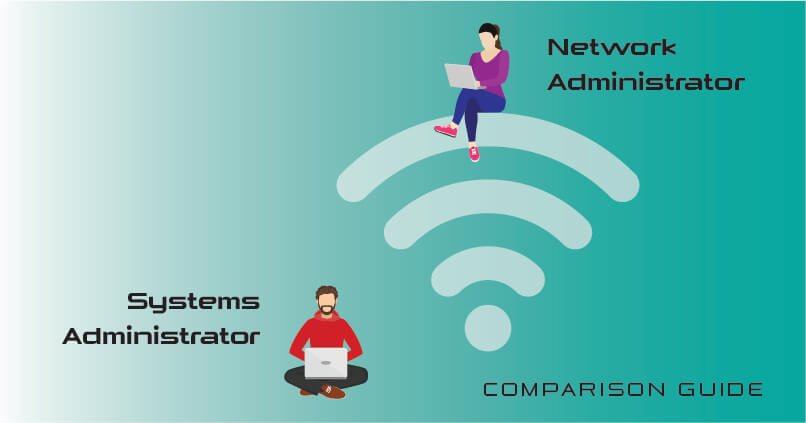Computer systems and networks. Networks and systems. What’s the difference? Ask people outside the world of information technology and you might get a blank stare.
It’s true that some terminology — for example, the job titles network administrator and systems administrator — are often used interchangeably. It’s also true that the duties and responsibilities connected to these vitally important job titles vary depending on the organization, and that in smaller companies one person might be responsible for both jobs.
However, there also significant fundamental differences. And since skilled professionals to fill these positions are in constant demand, those who are pursuing a career in IT may wonder which position is best suited to their skills and experience when it comes to the network administrator vs. systems administrator question.
Read on to take a close look at the similarities and differences, as well as helpful information about how educational opportunities like a sought-after industry certification or advanced degree can help you achieve your career goals.
What Do Network Administrators Focus On?
Network Interview, a website dedicated to professional network engineers sharing insight into their industry, outlines the duties of a network administrator:
- Monitoring the network — which is the largest responsibility!
- Ordering network equipment, including firewalls, switches, etc.
- Configuring/racking/testing network equipment
- Providing regular network maintenance for patching and updates
- Network troubleshooting
- Responsible for cabling
Software company Hyland highlights their employees in a Day in the Life blog series in order to provide a sneak peek at what it’s like to work at different departments within the company. In one interview, Nathan Bonner, a Network and Security Administrator II, explains that “having a good understanding of networking, network topology, switching, routing, and firewalls is very important” for his position, adding that “on the security side, having a good grasp of how attacks work on networks” is also crucial. “Vulnerability management is key there.”
What Do Systems Administrators Focus On?
Glassdoor lists a variety of responsibilities for a system network administrator, including:
- Maintaining, configuring, and operating computer systems and servers
- Installing and updating software
- Participating in research and development to keep up to date on the IT world and the needs of their organization
- Resolve problems and issues with computer and server systems
If you’re in this position, you will also likely monitor security tools and maintain the internet connection and firewall, according to Indeed.
In addition, Network Interview also lists project management and providing support among the responsibilities of a systems administrator.
[RELATED] Which Cyber Security Program is Right For You? Download our free infographic to help decide >>
How Do Network and Systems Admin Roles Overlap?
Network and systems administrator roles are rooted in information technology, which means there will likely be some overlap, especially in small companies and organizations that don’t have a robust IT team.
“However, if you speak with anyone at larger organizations, you’ll soon discover clear distinctions between the two roles,” according to IT certification company CBTNuggets. “In fact, as the scale of the IT infrastructure grows and complexity increases, their functions may be further divided and more specialized.”

Education and Certifications for a Network Administrator vs. a System Administrator
In most cases, an associate or bachelor’s degree in computer science or information technology is required for either position. There are also numerous certificates that are helpful in both career paths, such as CompTIA Network+ and CompTIA Security+. In some cases, it might be advantageous to pursue vendor-specific certifications, depending on the products and platforms your employer works with.
Advanced degrees in the field are typically not a prerequisite, but they can give you an edge over the competition, and in some cases, they may be preferred or required by certain employers.
| Bachelor’s Degree | Certificates | Advanced Degrees | |
| Network Administrator |
|
|
|
| Systems Administrator |
|
|
|
Salary Comparison and Outlook
Overall, employment of computer IT-related occupations is expected to grow a fast rate of 11% from 2019 to 2029. And because these positions are in such high demand, you can expect lucrative salaries that can top six figures depending on your responsibilities, experience and education.
The median pay for network and computer systems administrators is $83,510, with the top 10% earning more than $132,520, according to the U.S. Bureau of Labor Statistics. Employment is projected to grow at 5% from 2018 to 2028, and “demand for information technology workers is high and should continue to grow as firms invest in newer, faster technology and mobile networks.”
According to Indeed, the highest paying U.S. cities for network administrators are Washington, D.C.; Houston, Texas; and Atlanta, Ga. For systems administrators, it’s Washington, D.C.; Chicago, Ill.; and New York City.
A recent search on LinkedIn found almost 20,000 results for network administrator positions. (You can see the most up-to-date list here.) Here is a sampling of the companies or organizations that are hiring for this position:
- Amazon
- Overstock.com
- General Mills
- Microsoft
- Northrup Grumman
- Salesforce
A search for systems administrator found 17,000 results on LinkedIn, some companies of which are cited below. (Click here for the most recent search results.)
- Booz Allen Hamilton
- National Parks Conservation Association
- Fanatics, Inc.
- Fidelity Investments
- DraftKings, Inc.
Since the positions do overlap, the search results for each have a tendency to do the same. You may also uncover positions with similar responsibilities but different names, such as IT System Administrator, Network Engineer Systems Administrator, End User Support Network Technician, Network Engineer and System Admin Analyst.
In addition, two other positions you are likely to come across are database administrator and security administrator.
CBTNuggets explains that “the database administrator job is to organize and secure the organization’s data” while also confirming “that the data is available to the users and applications that need it.” These positions may work with systems administrators when a database software needs to be updated, for example.
A security administrator is a newer position, and as the name implies, the responsibilities include everything security-related when it comes to data, systems and networks.
Just to recap, here is a quick breakdown:
Network Administrator
Salary range: $34,000 to $106,000
For your info: Indeed’s “Learn About Being a Network Administrator” career guide includes an example of a job description and outlines a typical work environment.
Systems Administrator
Salary range: $37,000 to $114,000
For your info: Check out the System and Network Administrator Group on LinkedIn to connect with other individuals in your field (the group has 25K+ members!).
Database Administrator
Salary range: $51,800 to $148,060
For your info: This position may including tracking buyers’ credit card information for retail companies or managing patient medical records in the health care industry, according to the U.S. Bureau of Labor Statistics.
Security Administrator
Salary range: $67,846 to $95,289
For your info: A recent LinkedIn search for this position revealed more than 14,000 results. See the complete list here.
Educational Preparation for Network and Systems Administrator
Many people who are interested in a career in network or systems administrator roles may also find themselves interested in the ever-growing world of cybersecurity. IT-related jobs are abundant, and the opportunities seem endless across a wide variety of industries.
An advanced degree in an IT-related field, such as cybersecurity, can provide an immersive career-building educational experience that gives you a valuable competitive edge over the competition.
The University of San Diego — a highly regarded industry thought leader and education provider — offers a 100% online Master of Science in Cyber Security Operations and Leadership degree program, which features practical, cutting-edge curriculum taught by expert instructors who share insights drawn from highly relevant experience.





